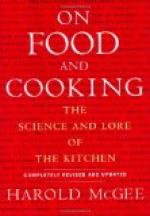“Simplicity in Diet.—Taking too many kinds of food at a meal is a common fault which is often a cause of disease of the digestive-organs. Those nations are the most hardy and enduring whose dietary is most simple. The Scotch peasantry live chiefly upon oatmeal, the Irish upon potatoes, milk, and oatmeal, the Italian upon peas, beans, macaroni, and chestnuts; yet all these are noted for remarkable health and endurance. The natives of the Canary Islands, an exceedingly well-developed and vigorous race, subsist almost chiefly upon a food which they call gofio, consisting of parched grain, coarsely ground in a mortar and mixed with water.
“Eating when Tired.—It is not well to eat when exhausted by violent exercise, as the system is not prepared to do the work of digestion well. Sleeping immediately after eating is also a harmful practice. The process of digestion cannot well be performed during sleep, and sleep is disturbed by the ineffective efforts of the digestive organs. Hence the well-known evil effects of late suppers.
“Eating too Much.—Hasty eating is the greatest cause of over-eating. When one eats too rapidly, the food is crowded into the stomach so fast that nature has no time to cry, ‘Enough,’ by taking away the appetite before too much has been eaten. When an excess of food is taken, it is likely to ferment or sour before it can be digested. One who eats too much usually feels dull after eating.
“How Much Food is Enough?—The proper quantity for each person to take is what he is able to digest and utilize. This amount of various with each individual, at different times. The amount needed will vary with the amount of work done, mental or muscular; with the weather or the season of the year, more food being required in cold than in warm weather: with the age of an individual, very old and very young persons requiring less food than those of middle age. An unperverted appetite, not artificially stimulated, is a safe guide. Drowsiness, dullness, and heaviness at the stomach are indications of an excess of eating, and naturally suggest a lessening of the quantity of food, unless the symptoms are known to arise from some other cause.
“Excess of Certain Food Elements.—When sugar is too freely used, either with food or in the form of sweetmeats or candies, indigestion, and even more serious disease, is likely to result. Fats, when freely used, give rise to indigestion and ‘biliousness.’ An excess of albumen from the too free use of meat is harmful. Only a limited amount of this element can be used; an excess is treated as waste matter, and must be removed from the system by the liver and the kidneys. The majority of persons would enjoy better health by using meat more moderately than is customary in this country.
“Deficiency of Certain Food Elements.—A diet deficient in any important food element is even more detrimental to health than a diet in which certain elements are in excess.




